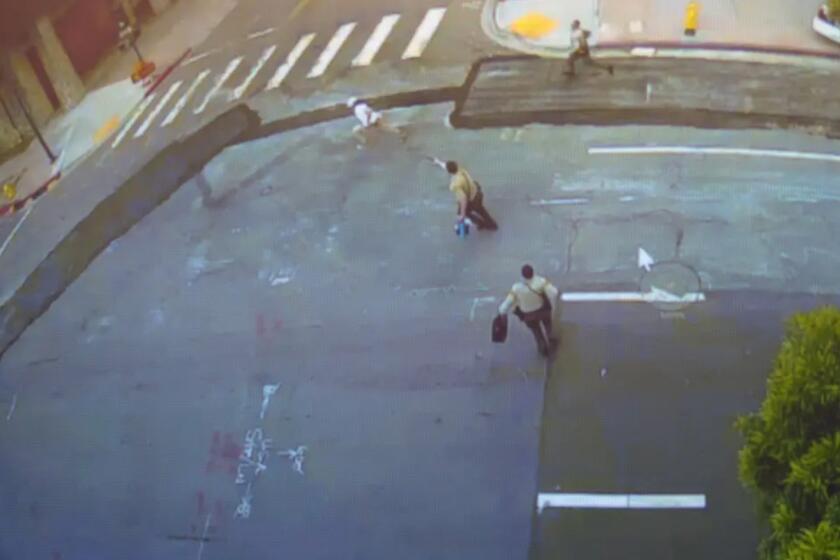Justices Asked to OK Murder Charge in Drug Death
She had gone to a Santa Ana motel room to inhale lines of cocaine and to smoke hand-rolled cigarettes made of cocaine and tobacco that are known as “coco puffs.”
Soon, she was sitting in a glassy-eyed stupor from the effects of the illicit drug. Her two companions realized she had stopped breathing and took her outside for fresh air, but to no avail. When paramedics arrived, they found that Jennie Licerio had died from acute cocaine intoxication.
The 19-year-old woman’s death set the stage for a widely watched test case to be argued this week in Los Angeles before the state Supreme Court.
A coalition of state and local prosecutors is asking the justices to permit authorities to bring a second-degree murder charge against Sandy Patterson, the Tustin man they say furnished the drug that killed Licerio.
‘Inherently Dangerous’
The prosecutors want the high court to rule that providing cocaine is an “inherently dangerous” act and to overturn previous rulings they say have effectively prevented murder prosecutions in cocaine deaths and also have imperiled use of such charges in deaths involving heroin and other drugs.
The case comes before the justices in the wake of reports of massive use of cocaine in the United States and a steady increase in deaths attributed to the drug.
Authorities estimate that more than 20 million Americans have used cocaine. According to the National Institute on Drug Abuse, a survey of medical examiners in 27 metropolitan areas shows the number of cocaine-related deaths rose last year to 1,582--triple the number in 1983.
The prosecutors say the ability to press murder charges for cocaine-related deaths would provide a useful weapon against drug trafficking and justly punish dealers whose wares prove fatal.
“If someone sells or otherwise furnishes a substance like cocaine, they ought to be fully liable when death results,” said Thomas J. Borris, an Orange County deputy district attorney. “It’s just like administering poison.”
Attorneys backing the defendant in the case argue that although cocaine undeniably is a serious national problem, its use has not been shown to be inherently dangerous to life. Many more people--perhaps hundreds of thousands annually--die from cigarette or alcohol use, they contend.
‘Completely Unanticipated’
Permitting a murder prosecution for merely supplying the drug would unfairly impose harsh sentences for wholly unintended results, the lawyers say.
“When you talk in moral terms, it’s simply not fair to classify someone as a murderer for something that was completely unanticipated and that no reasonable person could have foreseen,” said Philip M. Brooks, a state deputy public defender. “If these people are drug dealers, let them be prosecuted, but prosecute them as drug dealers, not murderers.”
The case arose in 1986 when, according to Orange County authorities, Licerio and another young woman met Patterson and agreed to go to his motel room, where he provided them with cocaine. After Licerio’s death, prosecutors charged Patterson with furnishing cocaine, a felony, and with second-degree murder in the death of Licerio.
California, like most other states, permits murder charges to be brought when death results during commission of a felony, even when a killing is unintended or accidental. The aim of the felony-murder rule is to deter crime by holding criminals strictly liable for the consequences of dangerous and violent acts.
State penal statutes specifically provide for first-degree felony-murder prosecutions for killings in a robbery, rape, arson and certain other crimes. The punishment for such murders ranges from 25 years to life in prison or the death penalty in some circumstances.
The courts have also permitted second-degree felony-murder charges when death results from a crime found to be “inherently dangerous” to human life. A 1958 ruling, for example, allowed such charges for furnishing a victim a fatal dose of heroin, but later decisions have raised doubt about the validity of such prosecutions. The punishment for these second-degree murders is 15 years to life in prison.
In the case the justices will hear this week, Patterson pleaded guilty to furnishing cocaine--an offense punishable by three to five years in prison. But he won dismissal of the murder charge in Orange County Superior Court. A state Court of Appeal in Santa Ana upheld the dismissal, saying it had no choice under state Supreme Court rulings that it said had brought the law “to the brink of logical absurdity.”
The high court held in 1965 that a felony can be found “inherently dangerous”--and thus support a second-degree felony-murder charge--only if found dangerous when “viewed in the abstract.” The justices said that it is necessary to look at the issue in general terms because if the trial courts look instead to the actual circumstances in cases where the result was death, they will almost always find the felony dangerous.
Another Decision
In 1984, the justices went further by ruling that murder charges cannot be brought if the underlying felony that allegedly led to the killing could have been committed in a way that was not dangerous.
The state Court of Appeal concluded that, under the rulings, Patterson cannot be prosecuted for murder. Although he was accused of “furnishing” cocaine, the statute under which he was charged can also be violated in ways that are not inherently dangerous--such as “transporting” the drug, the Court of Appeal noted.
“Although we are, of course, bound by these holdings, we find their rationale difficult to accept,” Appellate Justice Thomas F. Crosby wrote for the panel. The second-degree felony-murder rule ought to simply be abolished or, if retained, modified so that trial courts can examine the defendant’s actual conduct and decide whether it was inherently dangerous, the court said.
In their subsequent appeal of the ruling to the state Supreme Court, Orange County authorities have been joined by the state attorney general’s office, the California District Attorneys Assn. and the Pacific Legal Foundation, a conservative public-interest law firm.
The Orange County prosecutors argue that the current state of the law in California allows many otherwise guilty drug suppliers to avoid felony-murder charges. Past rulings should be modified to permit trial courts to focus on the specific way the statute was violated--such as furnishing the drug--and not on the alternative ways the statute could have been violated, the prosecutors say.
Public Defenders’ Support
Stephen Gilbert of Santa Monica, the attorney representing Patterson before the high court, is receiving support from the state public defender’s office and the Orange County public defender’s office in urging the justices to uphold the Court of Appeal ruling.
Patterson’s backers argue that the felony-murder rule is an outdated legal concept whose continued existence unfairly punishes unintended killings and deprives defendants in such cases of their right to due process of law. The rule, they say, should be abandoned. Meanwhile, if someone maliciously uses a drug to kill someone, he can be prosecuted directly for murder, the attorneys say.
In briefs to the court, Gilbert contends that contrary to the prosecutors’ contentions, there is insufficient medical evidence to show that cocaine use is likely to cause death. The reported deaths from cocaine are “a serious problem to be sure, but a statistically insignificant one when one considers that millions of persons use the drug,” Gilbert said.
Attorneys on both sides say they cannot predict precisely how many felony-murder prosecutions will arise if the justices clear the way for such charges against drug dealers. But they note that authorities from throughout California have inquired about the case and say that in view of the widespread nature of drug use, the number of prosecutions could be substantial.
‘A Lot of Potential Cases’
“Unfortunately, there are a lot of potential cases like this one because drug overdoses are an increasing problem in the state,” said Michael D. Schwartz, a Ventura County prosecutor representing the district attorneys association in the case. “Felony murder charges could be an effective tool against the problem.”
Anthony T. Caso, a lawyer for the Pacific Legal Foundation, said that regardless of the actual number of prosecutions, the threat of such charges could prove a significant deterrent to drug pushing.
“We’re talking about spending a few years in prison for furnishing a drug against a much stiffer term for felony-murder,” Caso said. “The drug dealer will know that the risk of doing business has gone way up.”
More to Read
Start your day right
Sign up for Essential California for news, features and recommendations from the L.A. Times and beyond in your inbox six days a week.
You may occasionally receive promotional content from the Los Angeles Times.






